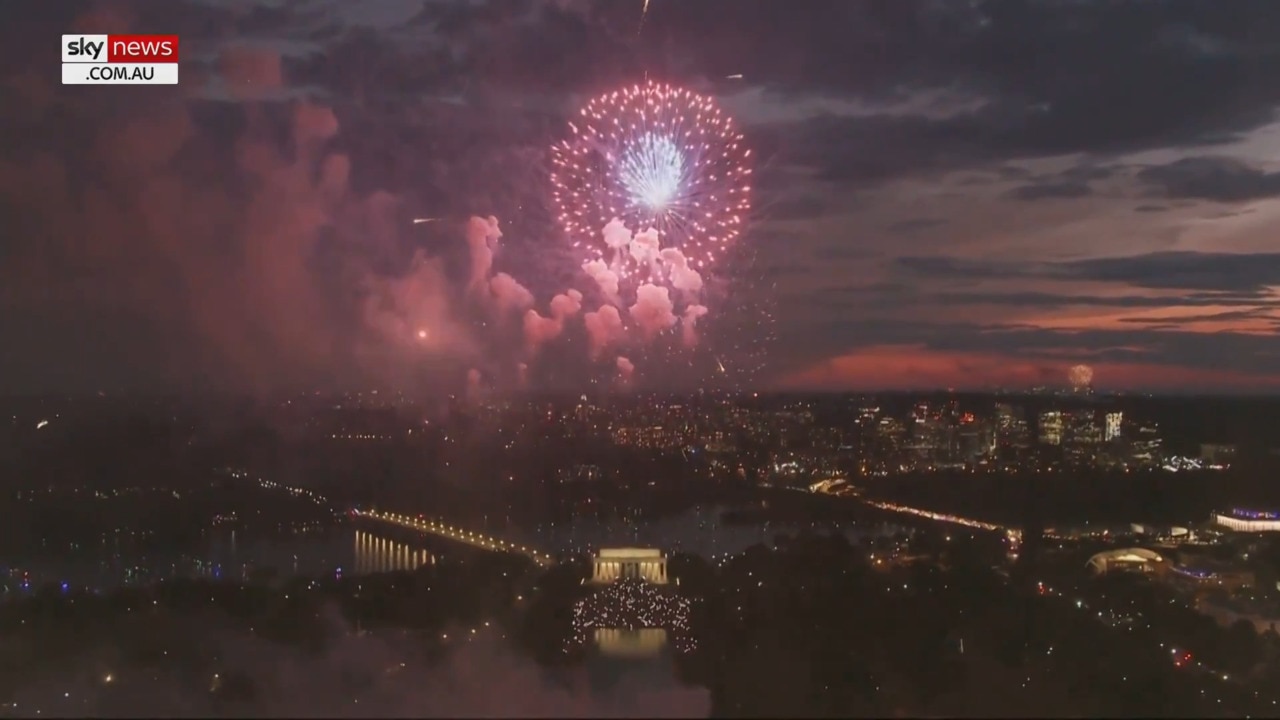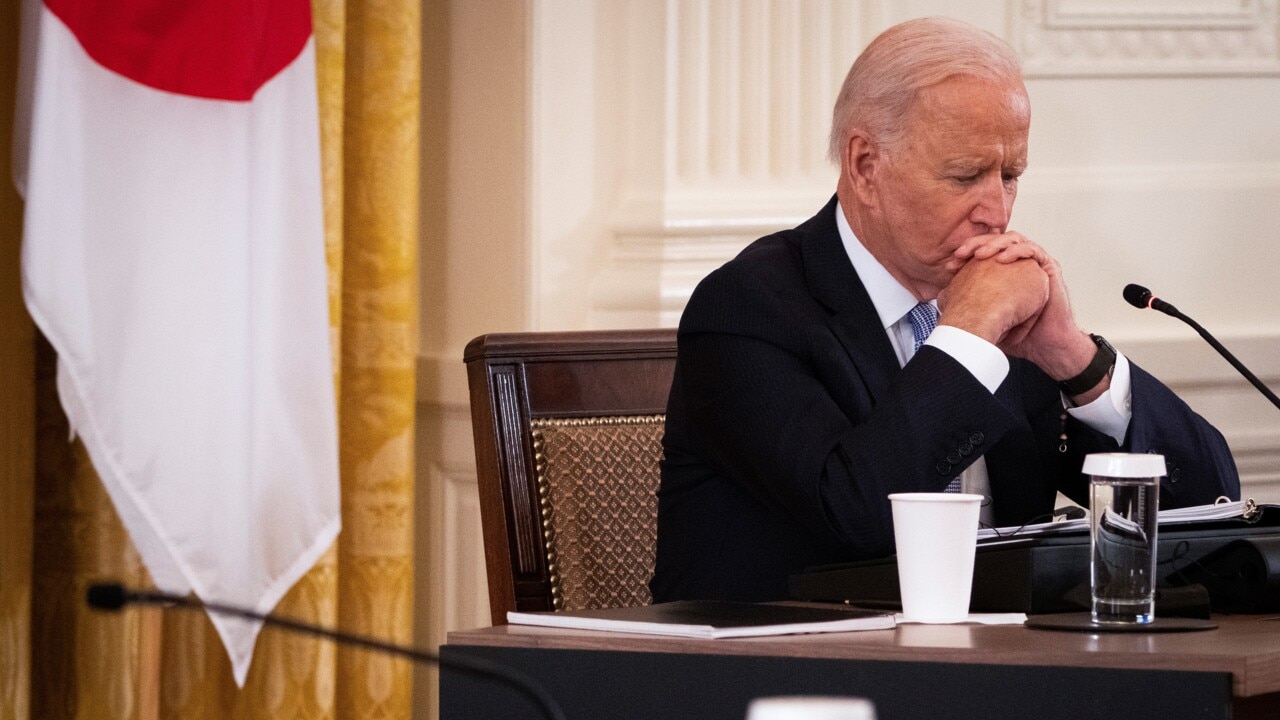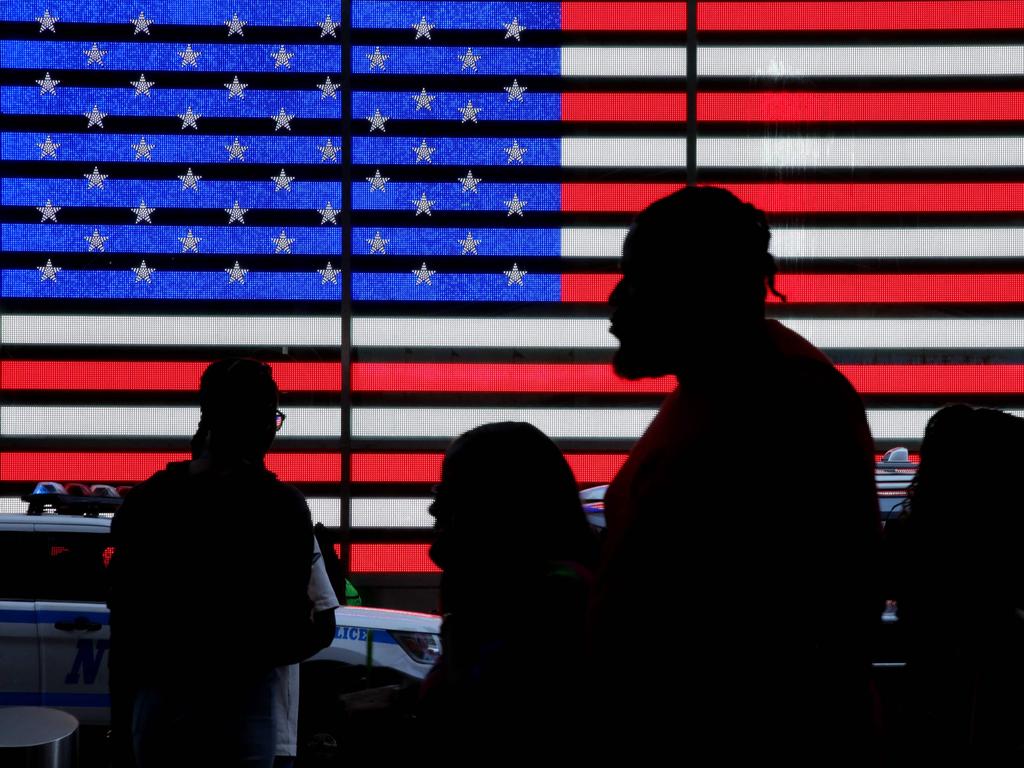Americans’ gloom and division fuelled by polarised politics
Plunging indicators of American social cohesion and national pride stem from an existential political battle to change the US constitution. Australia should watch and learn.

Survey after survey points to a population that is increasingly resentful, divided, pessimistic, suspicious and ashamed, especially the younger generations. Since 2001, the first year Gallup asked the question, the share of Americans who feel “extremely proud” of their country has plunged from 55 per cent to 39 per cent.
For the first time, the share of Americans who feel their country’s best days are ahead has dropped below 50 per cent, down nine points to 43 per cent from two years ago and a staggering 20 points since 2012, according to a Fox News poll conducted last month. According to a Pew survey conducted in June last year, more than 40 per cent of Americans aged 18 to 29 said other countries were “better than the US” – more than four times the proportion of over-65s who made that claim.
Only 38 per cent of Americans said patriotism mattered, down from 70 per cent in 1998, according to a March poll by The Wall Street Journal. Again, the generational gulf was stark: 23 per cent of adults under 30 said patriotism was “very important” compared with 59 per cent for those over 65.

“The only priority the Journal tested that has grown in importance in the past quarter-century is money, which was cited as very important by 43 per cent in the new survey, up from 31 per cent in 1998,” the newspaper said.
About 70 per cent of Americans consistently tell the major US pollsters their nation is headed in the wrong direction.
The share of black Americans who say relations between whites and blacks are “very” or “somewhat” good has fallen steadily from 66 per cent in 2013 to 33 per cent last year, according to Pew Research. Among whites, meanwhile, the share has fallen from 72 per cent to 43 per cent across the same period.
These shifts have occurred without any obvious change in the relative positions of blacks and whites in the US, economically or socially – if anything, the situation of the former has probably improved across the period.
It would seem for many the American dream is becoming a nightmare. Various social and economic statistics can explain the angst. Chronic disease, including depression, diabetes and autism, has exploded in the US while life expectancy, especially among poor white Americans, has stagnated or even fallen. Two-thirds of Americans use prescription drugs regularly and a quarter have used three or more in the past 30 days, according to the Centres for Disease Control and Prevention.

Wealth inequality has continued its ascent: last year the bottom 50 per cent of US households owned 2.4 per cent of total household wealth and the top 1 per cent more than 31 per cent, according to the Federal Reserve. Some of the disparity no doubt stems from individual effort, saving and innovation, but a lot doesn’t.
The US economy remains dominated by vast oligopolies that systematically gouge the population, be it in banking, telecommunications, airlines, pharmaceuticals or social media.
More recently, Americans’ trust in government has been dealt a hammer blow by the Covid-19 pandemic as “the science”repeatedly was shown to be wrong, governments overreached in censoring citizens and unprecedented mandates were imposed.
Crime soared in 2020 across the US and has remained elevated.
The printing of trillions of dollars of new money, much of it wasted as in Australia, not only elicited a surge in inflation that sharply has dragged down Americans’ living standards but also put a question mark over the morality of the monetary system itself.
The US political system, at least nationally, is failing to address this multitude of social and economic problems Americans face because it’s distracted, exhausted even, by a titanic philosophical battle. The Punch and Judy show of Joe Biden and Donald Trump obscures this battle.

The Democratic Party increasingly believes individuals’ race, gender and sexuality should fundamentally define their relationship with the state and with other citizens. Society comprises competing groups as much as individuals and families. At the same time, the party has become far less well disposed to freedom of speech, the cornerstone of the US constitutional freedoms.
As a Louisiana federal district judge suggested last week, throughout the pandemic the Biden administration had engaged in “the most massive attack against free speech in United States’ history” by pressuring social media companies to censor posts it didn’t like (many of which turned out to be accurate).
The Democratic Party, now overwhelmingly the party of the wealthy and the establishment, rarely talks about socio-economic disadvantage, once its mainstay, but rather race, sexuality and gender, which correlate weakly with socio-economic status.
These differences aren’t quibbles about the top marginal tax rate or the scope of public health care but, rather, profound philosophical differences that will take years to resolve.
Whatever their merits, they are anathema to the US Constitution and the ideals on which the US was founded, creating a political chasm almost as fundamental as that between communism and capitalism, which animated the central ideological debate of earlier centuries. It’s a different philosophy, but also a political strategy.

These days the Democrats win elections by cobbling together coalitions of aggrieved “minorities” – women, immigrants, LGBTI and black Americans, union members – with the help of a mainstream media that is overwhelmingly supportive. Last week’s US Supreme Court rulings unfavourable to the Biden administration crystallised these profound politics.
The court ruled that race-based affirmative action in universities was contrary to both the Constitution and civil rights law. It ruled that a graphic designer in Colorado couldn’t be forced to produce a website that contradicted her beliefs. And it ruled the administration couldn’t arbitrarily spend hundreds of billions of dollars on cancelling student loans without congressional approval.
Reading the minority dissent arguments, it is hard not to perceive a desire to “get around” the Constitution rather than to apply what it says.
The Republican Party, for all its flaws, has become the defender of the Constitution against a Democratic Party that self-evidently no longer agrees with critical parts of it. The GOP celebrated last week’s court decisions but the longevity of the decisions is uncertain. It’s not that elite universities will find a way to get around the ruling to avoid race-based admissions, but rather that the bulk of US business elites, academics (and the next generation of leaders they teach), journalists and bureaucrats overwhelmingly share the Democratic Party’s aims.
Arrayed against such forces, in the long run, the US Constitution hasn’t much hope. The Supreme Court’s verdicts could well be the last hurrahs of a fading era.
Australia should watch and learn from America’s internal struggles, especially as we don’t have a rights-based constitution to slow down fundamental political change.








It has become a cliche to say the US is “more divided than ever”, which obviously is not true given the civil war from 1861 to 1865 and the waves of protests and riots that swept across the country in the 1960s and ’70s during the civil rights movement and Vietnam War. Nevertheless, it’s difficult to celebrate Independence Day on July 4, America’s national holiday marking the 13 colonies’ declaration of independence from Britain, without a tinge of despondence at US decline.